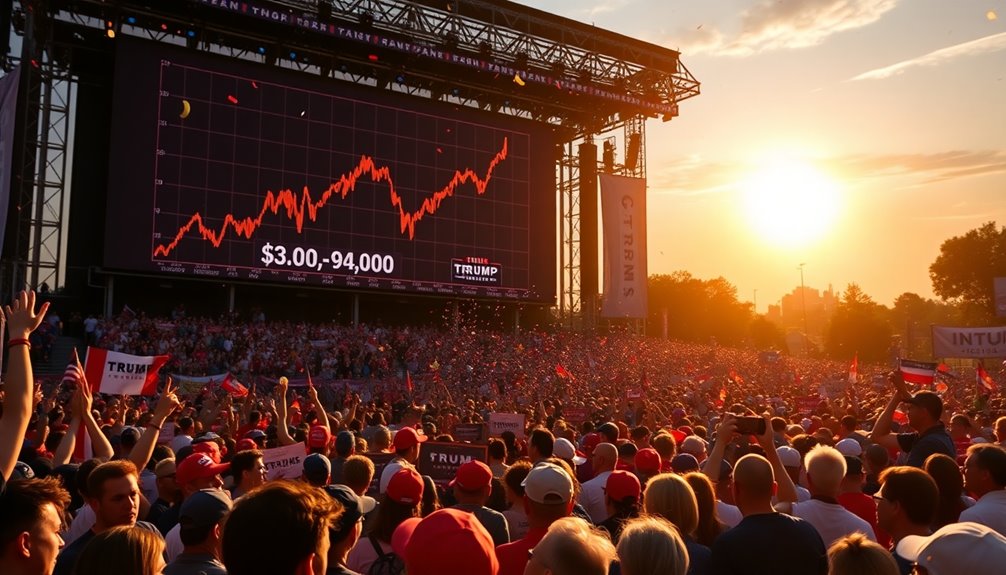Bitcoin's recent surge back to $94,000 is fueled by Trump's plans for pro-crypto executive orders. These initiatives aim to support digital assets and foster a favorable environment for blockchain innovation. With a focus on reducing regulatory burdens and easing taxes on transactions, it's clear the goal is to position the U.S. as the "crypto capital of the planet." As corporate investment in Bitcoin grows, market dynamics may shift dramatically. Keeping an eye on these developments could offer you deeper insights into how they might impact your own investments and the broader crypto landscape.
Key Takeaways
- Trump's upcoming executive orders aim to foster a business-friendly environment for digital assets, boosting investor confidence in Bitcoin.
- The U.S. plans to position itself as the "crypto capital of the planet," attracting investment and driving Bitcoin's price surge.
- Recent corporate investments in Bitcoin have increased significantly, contributing to market stability and renewed interest as prices rise.
- Regulatory clarity from the Trump administration is expected to ease compliance burdens, further encouraging investment in Bitcoin.
- Bitcoin's fixed supply and recent market dynamics have led to volatility, but favorable news can catalyze rapid price increases.
Trump's Crypto Executive Orders

As the cryptocurrency landscape evolves, Trump's upcoming executive orders signal a significant shift in policy aimed at supporting digital assets and fostering innovation. These initiatives focus on advancing blockchain technology and creating a more business-friendly environment. You can expect the administration to address de-banking issues, enhancing conditions for crypto companies. By providing regulatory clarity, they aim to reduce the compliance burden on startups, encouraging growth. Key figures like Marc Andreessen and David Sacks are actively shaping this agenda, with the goal of rolling back restrictive Biden-era policies. Moreover, easing AI regulations and streamlining federal oversight will promote innovation and investment, positioning the U.S. to compete more effectively with China in emerging technologies. This renewed focus on de-banking challenges is expected to provide much-needed support for crypto firms facing financial hurdles.
Trump's Crypto Policy Announcement

While many may have doubted his stance on cryptocurrencies in the past, Trump's recent policy announcement marks a dramatic shift toward embracing digital assets.
He aims to position the U.S. as the "crypto capital of the planet" by creating a favorable regulatory environment with clearer guidelines. His plans include the establishment of a Presidential Bitcoin Advisory Board and a strategic Bitcoin reserve to stabilize the asset's value. Trump also intends to lower taxes on crypto transactions, encouraging investment in the sector. With pro-crypto appointments throughout his administration, he's signaling a commitment to integrating cryptocurrencies into economic growth and reversing restrictive regulations from the previous administration, ultimately fostering innovation and boosting investor confidence. This strategy aligns with his goal of emphasizing decentralized finance as a national priority.
Price Volatility and Trading Volume

Trump's recent embrace of cryptocurrencies is likely to impact not just policy but also the dynamics of Bitcoin's price volatility and trading volume.
With a fixed supply of 21 million coins, Bitcoin's price swings dramatically as demand fluctuates. Current circulation stands at about 19.6 million, and the halving mechanism keeps supply tight, often driving prices up during periods of economic uncertainty. Historically, the halving mechanism has been linked to significant price rallies, which could further amplify the effects of recent political developments.
You might notice that macroeconomic data, like nonfarm payrolls, can cause immediate price drops, while global instability often leads investors to Bitcoin for stability.
Recently, trading volumes have hit lows not seen since before the U.S. elections, signaling a potential risk-averse trend among investors amidst market anxiety and diminishing enthusiasm for Trump's political future.
Corporate Investment in Bitcoin

Corporate investment in Bitcoin has exploded in recent years, reflecting a growing recognition of its potential as an asset class. Since 2020, corporate Bitcoin holdings surged by 587%, with companies now holding over 3% of all Bitcoin in circulation.
U.S. companies account for nearly half of these holdings, totaling around $19.7 billion. Notably, private firms hold 23,000 more BTC than public ones. Companies like MicroStrategy and Block adopt aggressive strategies, with MicroStrategy's balance sheet comprising 80% Bitcoin.
They view Bitcoin as a hedge against inflation and a way to diversify treasury assets. However, challenges like price volatility and regulatory compliance remain significant concerns. Additionally, business Bitcoin holdings are expected to grow by 204 to 519 BTC daily until 2026, indicating strong ongoing interest.
With projected growth in holdings, the corporate interest in Bitcoin shows no signs of slowing down.
Campaign Rallies and Bitcoin Trends

As the political landscape evolves, campaign rallies are increasingly highlighting the potential of Bitcoin, capturing public attention and sparking interest among investors.
With the Trump administration showing a pro-crypto stance, you might see a boost in Bitcoin's price. The idea of the U.S. accumulating Bitcoin as a strategic reserve could legitimize the cryptocurrency, increasing institutional demand. Additionally, David Sacks appointed as AI and crypto czar could further streamline regulatory processes, encouraging broader adoption. Furthermore, the increasing importance of digital asset management will play a crucial role in how both individuals and corporations navigate their crypto investments.
Past government support has historically led to price surges, so this trend could shift market sentiment positively. As public discussions around Bitcoin grow, awareness and investor confidence rise, encouraging more participation.
Educational efforts also demystify the cryptocurrency, making it accessible. This community engagement fosters a sense of belonging among enthusiasts, driving demand and potentially pushing prices higher.
Regulatory Landscape Changes Ahead

With the regulatory landscape shifting rapidly, it's crucial to stay informed about how these changes could impact the cryptocurrency market.
The SEC's aggressive stance and the CFTC's proposed role as a regulator of digital asset commodities are key developments. As Crypto.com challenges the SEC's jurisdiction, the need for regulatory clarity is evident. Mixed court outcomes for the SEC, such as the rulings in SEC v. Coinbase and the Ripple case, raise questions about regulatory authority and the future of enforcement actions.
Regulators are prioritizing consumer and investor protections, focusing on fraud prevention and market integrity. The stablecoin market's explosive growth demands thorough due diligence from issuers to ensure stability.
The Trump administration's pro-crypto stance, including a supportive SEC chair and a Republican-majority Congress, signals potential regulatory shifts that could favor the crypto space.
Staying updated on these changes is essential for navigating this evolving landscape.
Frequently Asked Questions
How Does Bitcoin Mining Impact the Environment?
Bitcoin mining has a significant environmental impact. It consumes vast amounts of electricity, often generated from fossil fuels, leading to high carbon emissions.
You'll notice that mining also contributes to electronic waste, as specialized hardware has a short lifespan. Additionally, it requires substantial water and land resources, affecting local ecosystems.
As a result, the overall carbon footprint of bitcoin mining raises serious concerns about its sustainability and long-term environmental effects.
What Are the Tax Implications of Bitcoin Investments?
When you invest in Bitcoin, you need to consider the tax implications.
If you sell or swap your Bitcoin within a year, you'll face short-term capital gains tax, which can go up to 37%.
If you hold it for over a year, you may benefit from lower long-term capital gains tax rates, ranging from 0% to 20%, depending on your income.
Always report your transactions accurately to avoid issues with tax compliance.
How Can I Securely Store My Bitcoin?
Storing your Bitcoin is like safeguarding treasure in a vault.
You've got options: use hardware wallets for offline security, or create paper wallets for a physical backup.
Keep your keys on air-gapped computers to fend off cyber threats.
Employ multi-signature wallets for added safety, and regularly back up your data.
Avoid public Wi-Fi to protect your access.
Staying vigilant and informed will help you keep your digital treasure secure.
What Are the Risks of Investing in Bitcoin?
When you invest in Bitcoin, you face several risks.
Transaction irreversibility means once you send funds, they can't be recovered. The technical complexity can lead to costly mistakes if you're not careful with wallets and exchanges.
Security risks from cyberattacks and outages can jeopardize your access to funds. Additionally, regulatory uncertainties may impact your investment's value, while counterparty risks put your funds at risk if exchanges or management fail.
How Does Bitcoin Compare to Traditional Currencies?
When you compare Bitcoin to traditional currencies, you'll notice key differences.
Bitcoin offers faster transactions and greater privacy, as it doesn't rely on banks or central authorities.
However, traditional currencies are backed by governments, providing stability and regulatory oversight.
While Bitcoin's value fluctuates with market demand, traditional currencies maintain a more consistent value.
Ultimately, your choice depends on whether you value decentralization and efficiency or stability and regulation in your financial transactions.
Conclusion
In conclusion, as Trump's potential pro-crypto executive orders loom, it's worth considering the theory that political endorsements can significantly influence market trends. The recent surge to $94,000 suggests that investors might be reacting not just to Bitcoin's fundamentals but also to the promise of a more favorable regulatory environment. If this theory holds, we could see further price stability and corporate interest, making Bitcoin a central player in both finance and politics moving forward.
Hans’s journalism and editorial leadership background at HARTSBURG NEWS has honed his ability to present information in a credible, well-structured manner. He prioritizes thorough research and factual accuracy, ensuring readers can rely on our coverage.









